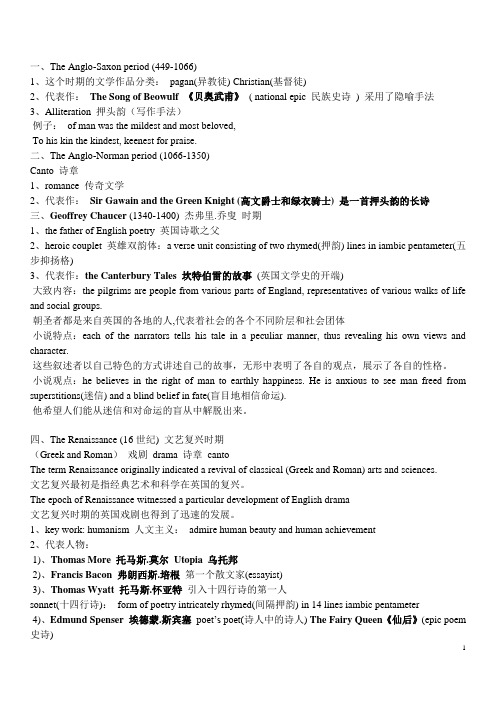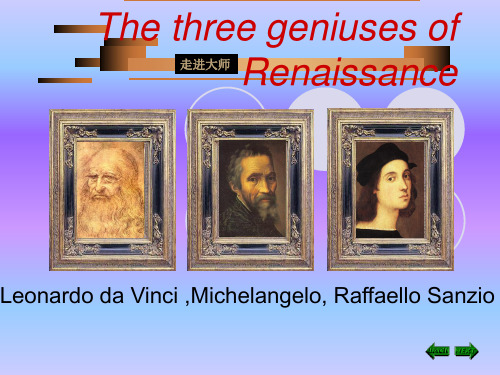Henri Lebesgue and the End of Classical Theories on Calculus -Xiaoping Ding
- 格式:pdf
- 大小:246.97 KB
- 文档页数:17


英语专八英美文学作品及作者简介☆英国文学名家名著《贝奥武甫》(Beowulf)是英国盎格鲁·撒克逊时期的一首英雄史诗,古英语文学的最高成就,同时标志着英国文学的开始。
史诗的第一部分讲述瑞典青年王子贝奥武甫来到丹麦,帮助丹麦国王赫罗斯加杀死了12年来常来进行夜袭的巨妖格伦德尔及他的母亲;第二部分简述了贝奥武甫继承王位,平安统治50年。
后来,他的国土被一条喷火巨龙蹂躏,老当益壮的贝奥武甫与火龙交战,杀死火龙,自己也受了致命伤。
杰弗里·乔叟(Geoffrey Chaucer ,1340-1400)是英国文学之父亲和前最杰出的作家。
主要作品有《坎特伯雷故事集》等。
作品的主要特点是主题、题材、风格、笔调的多样性及描写人对生活的追求的复杂性。
他的代表作品是《坎特伯雷故事集》(The Canterbury Tales)不仅描绘了31位朝圣者的各个社会阶层,而且也反映了他们各自叙述故事的不同风格,读者广泛,对后世影响很大。
威廉·莎士比亚(William Shakespeare ,1564-1616)是文艺复兴时期英国著名的剧作家和诗人。
他创作了大量的作品,其中包括喜剧、悲剧和历史剧。
他的剧本至今仍在许多国家上演,并为人们所普遍阅读。
莎上比亚的作品文才横溢,创造的喜、怒、哀、乐场面使人印象深刻,历久难忘。
主要作品有四大悲剧:《奥赛罗》(Othello)、《哈姆雷特》(Hamlet)、《麦克白》(Macbeth),《李尔王》(King Lear);四大喜剧:《仲夏夜之梦》(A Midsummer Night’s Dream)、《威尼斯商人》(The Merchant of Venice)、《无事生非》(Much Ado about Nothing)和《皆大欢喜》(As You Like It)等。
此外,历史剧《亨利六世》(Henry VI)三部曲,爱情悲剧《罗密欧与朱丽叶》(Romeo and Juliet)也都很受欢迎。


一、The Anglo-Saxon period (449-1066)1、这个时期的文学作品分类:pagan(异教徒) Christian(基督徒)2、代表作:The Song of Beowulf 《贝奥武甫》( national epic 民族史诗) 采用了隐喻手法3、Alliteration 押头韵(写作手法)例子:of man was the mildest and most beloved,To his kin the kindest, keenest for praise.二、The Anglo-Norman period (1066-1350)Canto 诗章1、romance 传奇文学2、代表作:Sir Gawain and the Green Knight (高文爵士和绿衣骑士) 是一首押头韵的长诗三、Geoffrey Chaucer (1340-1400) 杰弗里.乔叟时期1、the father of English poetry 英国诗歌之父2、heroic couplet 英雄双韵体:a verse unit consisting of two rhymed(押韵) lines in iambic pentameter(五步抑扬格)3、代表作:the Canterbury Tales 坎特伯雷的故事(英国文学史的开端)大致内容:the pilgrims are people from various parts of England, representatives of various walks of life and social groups.朝圣者都是来自英国的各地的人,代表着社会的各个不同阶层和社会团体小说特点:each of the narrators tells his tale in a peculiar manner, thus revealing his own views and character.这些叙述者以自己特色的方式讲述自己的故事,无形中表明了各自的观点,展示了各自的性格。


高二年级英语音乐流派与艺术家创作风格深化理解单选题40题1. In a concert hall, the orchestra is playing a piece of music with complex melodies, harmonious polyphony and strict forms. This kind of music often features the use of symphony orchestra and has a long history. Which music genre does it belong to?A. RockB. JazzC. ClassicalD. Pop答案:C。
解析:题干描述的是古典音乐的特点,古典音乐有复杂的旋律、和谐的复调以及严格的形式,常使用交响乐团演奏并且历史悠久。
选项A摇滚音乐通常节奏强烈、旋律简单直接且具有强烈的节拍感。
选项B爵士乐特点是即兴演奏、节奏复杂且独特的爵士和声。
选项D流行音乐风格较为通俗,节奏轻快,和题干描述不符。
本题没有涉及特殊语法知识。
2. A famous piece of music has a solemn and elegant melody. The composer was a master in the Classical period. He often used sonata form in his works. Which of the following composers might he be?A. Ludwig van BeethovenB. Elvis PresleyC. Bob DylanD. Michael Jackson答案:A。
解析:贝多芬是古典时期的著名作曲家,他的作品常常使用奏鸣曲式。
选项B猫王是摇滚和流行音乐领域的歌手,与古典音乐无关。
选项C鲍勃·迪伦是民谣歌手。
西方文论著作英汉名西方文论著作英汉对照书名1.Plato理想国?古希腊语:Πολιτε?α英语:The Republic文艺对话集?英语:Plato’s Dialogues法律篇?英语:The Laws2.Aristotle修辞学?英语:Rhetoric诗学?英语:Theory of Poetry3.Horatius诗艺?拉丁语:Ars Poetica 英语:Art of Poetry4.Longinus论崇高?拉丁语:Peri Ypsous5.Saint Augustine忏悔录?英语:The Confessions (原名:Confessiones )6.Saint Thomas Aquinas反异教大全?英语:Summa Contra Gentiles神学大全?英语:Summa Theologica7.Johannes Scotus Erigena自然的分类?希腊语:Periphyseon8.Peter Abelard我的苦难史?法语:Historia calamitatum 英语:The Story of My Misfortunes认识你自己?法语:Scito Te Ipsum9.Dante Alighiere神曲?意大利语:Divina Commedia论俗语?拉丁语: De vulgari eloquentia10.Philip Sidney为诗辩护?英语:An Apology For Poetry10.Leonardo da vinci论绘画?英语:Treatise on Painting11.Ludovico Castelvetro亚里士多德<诗学>诠释?英语:Annotation on Aristotle's poeticsNeo-Classicism12. Nicolas Boileau-Despreaux 布瓦洛《诗的艺术》L'Art poétique(法)The art of poetry(英)13. Alexander Pope浦柏《论批评》An Essay on CriticismThe Enlightenment (transitional)14. D.Diderot 狄德罗《论戏剧诗》An Essay of Dramatic Poesy《绘画论》15. G.E Lessing 莱辛《拉奥扎》Laocoon L aokoon oder über die Grenzen der Malerei und Poesie (Laocoon: An Essay on the Limits of Painting and Poetry)16. G.Vieo 维柯《新科学》Scienza NuovaEarly Modern PeriodGerman Classicism17. Immanuel Kant 康德《判断力批判》Critique of Judgment Kritik der Urteilskraft (Critique of Judment)18. Georg William Friedrich Hegel 黑格尔《美学》Vorlesungen über die ?sthetik (Lectures on A esthetics)19. Johann Wolfgang von Goethe 歌德《歌德谈话录》Gespr?che mit Goethe (德)Conversations with Goethe(英)20. Johann Christoph Friedrich Schiller 席勒《论美书简》Die Philosophie des Sch?nen《审美教育书简》über die ?sthetische Erziehung des Menschen in einer Reihe von Briefen (Letters Upon The Aesthetic Education of Man) Romanticism21. Heinrich Heine 海涅《论浪漫派》Die Romantik("Romanticism", shortcritical essay)22. William Wordsworth 华兹华斯《抒情歌谣集》序言》Lyrical Ballads23. Francois Rene de Chateaubriand 夏多勃里昂《基督教真理》Génie du christianisme.(法)The Genius of Christianity(英)Realism24. Stendhal司汤达《拉辛与莎士比亚》Racine et Shakespéare (法)Racine and Shakespeare(英)25. Belinsky别林斯基《艺术的概念》26. Chernishevsky 车尔尼雪夫斯基《艺术与现实的美学关系》Aesthetic Relations of Art to Reality27. Tolstoy托尔斯泰《艺术论》Чтотакоеискусство? Chto takoye iskusstvo?(俄)What Is Art?(英)Positivism28. Madame de Stael Germaine《论文学》,全名为《从社会制度与文学的关系论文学》De la littérature considérée dans ses rapports avec les institutions sociales29. Hippolyte Taine《艺术哲学》Philosophie de l’art (1865 et 1882)(The Philosophy of Art)Non-rationalism30. Arthur Schopenhauer《作为意志和表象的世界》Die Welt Als Wille und vorstellung,1818(The World as Will and Representation)31. Friedrich Wilhelm Nietzsche《悲剧的诞生》全名《悲剧的诞生:源于音乐的灵魂》Die Geburt der Trag?die aus dem Geiste der Musik. 1872在1886年则改以《悲剧的诞生:希腊文化和悲观主义》Die Geburt der Trag?die, Oder: Griechentum und Pessimismus为名重新出版(The Birth of Tragedy )A.Aestheticism32. Theophile Gautier《诗集》Poésies(1830)《莫般小姐》Mademoiselle de Maupin(1835)33. Walter Horatio Pater《文艺复兴:艺术和诗的研究》The Renaissance: Studies in Art and Poetry 34. Oscar wilde《批评即艺术家》The Critic as Artist《英国的文艺复兴》The English Renaissance of Art35. Francesco De Sanctis《批评文集》Saggi criticiB.Symbolism36. Charles Baudelaire《美学探奇》或译为《美学珍玩》Curiosités Esthétiques 186837. Paul Verlaine《诗艺》Poèmes saturniens 186638. Arthur Rimbaud《通灵人的信》L ettre à Paul Demeny 187139. Stephane Mallarme《谈文学运动——答儒勒.于莱问》(查不到法文名和英文名,中文名应该是《谈文学运动—斯特芬·马拉美答儒勃·于莱问》)Intuitionism40. Henri Bergson《笑之研究》Le rire. Essai sur la signification du comique (Laughter: An Essay on the Meaning of the Comic)41. Benedetto Croce《作为表现的科学和一般语言学的美学》Estetica come scienza dell'espressione e linguistica generale (1902)(Aesthetic as Science ofExpression and General Linguistic)《美学原理》Breviario di estetica (The Essence of Aesthetic)42. Sigmund Freud(Austrian)《梦的解析》Die TraumdeutungThe Interpretation of Dreams《作家与白日梦》Creative Writers and Day-dreaming《论创造力与无意识》On creativity and the Unconscious43. Carl Gustav Jung(Swiss)《心理学与文学》Psychology and Literature44. Roman Jakobson(Russian-American)《语言学与诗学》("Closing Statement: Linguistics and Poetics," in Style in Language)Linguistics and Poetics45. Boris Eichenbaum(Russian and Soviet)《论散文,论诗歌》(这本书不是很确定)ЛесковисовременнаяпрозаLeskov and Contemporary Prose46. Victor Shklovsky(Russian and Soviet)《作为手法的艺术》("Art as Technique": pages 15–21 Literary Theory) Art as Technique《词的复活》The Resurrection of the Word47. Northrop Frey(Canadian)《文学的原型》(没找到)《批评的解剖》Anatomy of Criticism48. A. Richards(British)《文学批评原理》The Principles of Literary Criticism《实用批评》Practical Criticism49. William Empson(British)《含混七型》Seven Types of Ambiguity《复杂词的结构》The Structure of Complex Words50. John Crowe Ransom(American)《新批评》The New Criticism《诗歌:本体论笔记》(没找到)51. Brooks/Warren:《怎样读诗》Understanding Poetry 是不是一般译为理解诗歌?不确定是不是对应这本。
贵族时代法国傅华萨(Jean Froissart)《闻见录》(Chronicles)《罗兰之歌》(The Song Of Roland)维永(Francois Montaigne)《诗集》(Poems)蒙田(Michel de Montaigne)《随笔集》(Essays)拉伯雷(Francois Rabelais)《巨人传》(Gargantua and Pantagrue)玛格丽特·德·纳瓦尔(Marguerite de Navarre)《七日谈》(The Heptameron)《杜·贝莱》(Joachim Du Bellay)《悔恨集》(The Regrets)赛弗(Maurice Sceve)《德丽亚》(Delie)龙萨(Pierre de Ronsard)《颂诗》、《挽歌》、《十四行诗》(Odes ,Elegies,Sonnets)柯门斯(Philippe de Conmmynes)《回忆录》(Memoirs)欧比涅(Agrippa d’Aubigne)《悲歌集》(Les Tragiques)卡涅尔(Robert Garnier)《马克·安东尼》(Mark A ntony)《犹太姑娘》(The Jewesses)高乃依(Pierre Corneille)《熙德》(The Cid)《波利耶克特》(Polyeucte)《尼高梅德》(Nicomede)《贺拉斯》(Horace)《西拿》(Cinna)《罗多古娜》(Rodogune)拉罗什富科(Francois de La Rochefoucauld)《箴言录》(Maxims)拉·封丹(Jean de La Fontaine)《寓言诗》(Fables)莫里哀(Moliere)《恨世者》(The Misanthrope)《答尔丢夫》(Tartuffe)《太太学堂》(The School for Wives)《女博士》(The Learned Ladies)《唐璜》(Don Juan )《丈夫学堂》(School for Husbands)《可笑的女才子》(Ridiculous Precieuses)《贵人迷》(The Would Gentleman)《吝啬鬼》(The Miser)《没病找病》(The Iiser)帕斯卡尔(Blaise Pascal)《思想录》(Pensees)博叙埃(Jacques-Benigne Bossuet)《追悼词》(Funerary Orations)布瓦洛(Nicolas Boileau-Despreaux)《诗艺》(The Art of Poetry)《经台吟》(Lutrin)拉辛(Jean Racine)《菲德拉》(Phaedra)《安德罗玛克》(Andromache)《布里塔尼居斯》(Britannicus)《阿达莉》(A thaliah)马里沃(Pierre Carlet de Marivaux)《喜剧七部》(Seven Comedies)卢梭(Jean-Jacques Rousseau)《忏悔录》(The Confessions)《爱弥尔》(Emile)《新爱洛绮丝》(La Nouvelle Heloise)伏尔泰(Voltaire)《查第格》(Zadig)《老实人》(Candide)《英国书信》(Letters on England)《里斯本地震》(The Lisbon Earthquake)普雷沃(Abbe Prevost)《曼侬·莱斯戈》(Manon Lescaut)拉法耶特夫人(Madame de La Fayette)《克莱芙王妃》(The Princess of Cleves)塞巴斯蒂安-罗克·尼科拉斯(Sebastien-Roch Nicolas de Chamfort)《完美文明的产物》(Products of the Perfected Civilization)狄德罗(Denis Diderot)《拉摩的侄儿》(Rameau’s Nephew)拉克洛(Choderlos de Laclos)《危险的交往》(Dangerous Liaisons)德国伊拉斯漠(Erasmus)《愚人颂》(In Praise of Folly)歌德(Johann Wolfgang von Goethe )《浮士德》(Faust)《诗与真》(Dichtung und Wahrheit)《埃格蒙特》(Egmont)《亲和力》(Elective Affinities)《少年维特之烦恼》(The Sorrows of Young Werther)《诗集》(Poems)《威廉·迈斯特的学习时代》(Wilhelm Meister’s Apprenticeship)《威廉·迈斯特的漫游时代》(Wilh elm Meister’s Years of Wandering)《意大利游记》(Italian Journey)《诗剧》和《赫尔曼与窦绿苔》(Verse Plays and Hermann and Dorothea)《罗马哀歌》、《威尼斯铭语》、《西东合集》(Roman Elegies, Venetian Epigrams, West-Eastern Divan)席勒(Friedrich Schiller)《强盗》(The Robbers)《玛丽·斯图亚特》(Mary Stuart)《华伦斯坦》(Wallenstein)《唐·卡洛斯》(Don Carlos)《论素朴诗和感伤诗》(On the Naive and Sentimental in Literature)莱辛(Gotthold Lessing)《拉奥孔》(Laocoon)《智者纳旦》(Nathan the Wise)荷尔德林(Friedrich Holderlin)《赞美诗与片段》(Hymns and Fragments)《诗选》(Selected Poems)克莱斯特(Heinrich von Kleist)《戏剧五部》(Five Plays)《故事集》(Stories)民主时代法国贡斯当(Benjamin Constant)《阿道尔夫》(Adolphe)《红色笔记》(The Red Notebook)夏多布里昂(Francois-Auguste-Rene de Chateaubriand)《阿达拉》(Atala)《勒内》(Rene)《基督教真谛》(The Genius of Christianity)拉马丁(Alphonse de Lamartine)《沉思集》(Meditations)维尼(Alfred de Vigny)《查特顿》(Chatterton)《诗集》(Poems)雨果(Victor Hugo)《光与影:诗选集》(The Distance, The Shadows: Selected Poems)《悲惨世界》(Les Miserables)《巴黎圣母院》(Notre-Dame of Paris)《论莎士比亚》(William Shakespeare)《海上劳工》(The Toilers of Sea)《撒旦的末日》(The End of Satan)《上帝》(God)缪塞(Alfred de Musset)《诗集》(Poems)《罗朗札齐奥》(Lorenzaccio)奈瓦尔(Gerard de Nerval)《幻影》(The Chimeras)《西尔葳》(Sylvie)《奥蕾丽亚》(Aurelia)戈蒂耶(Theophile Gautier)《莫班小姐》(Mademoiselle de Maupin)《珐琅与雕玉》(Enamels and Cameos)巴尔扎克(Honore de Balzac)《金目少女》(The Girl with the Golden Eyes)《路易·朗裴》(Louis Lambert)《驴皮记》(The Wild Ass’s Skin )《高老头》(Old Goriot)《贝姨》(Cousin Bette)《娼妓的奢华与穷因》(A Harlot High and Low)《欧也妮·葛朗台》(Eugenie Grandet)《于许勒·弥鲁蔼》(Ursule Mirouet)司汤达(Stendhal)《论爱情》(On Love)《红与黑》(The Red and the Blank)《巴马修道院》(The Charterhouse of Parma)福楼拜(Gustave Flaubert)《包法利夫人》(Madame Bovary)《情感教育》(Sentimental Education)《萨朗波》(Salammbo)《淳朴的心》(A Sinple Soul)乔治·桑(George Sand)《魔沼》(The Haunted Pool)波德莱尔(Charles Baudelaire)《恶之花》(Flowers of Evil)《巴黎的忧郁》(Paris Spleen)马拉梅(Stephane Mallarme)《诗与散文选集》(Selected Poetry and Prose)魏尔兰(Paul Verlaine)《诗选》(Selected Poems)兰波(Arthur Rimbaud)《全集》(Complete Works)科尔比埃尔(Tristan Corbiere)《黄色的爱》(Les Amours jaunes)拉弗格(Jules Laforgue)《作品选》(Selected Poems)莫泊桑(Guy De Maupassant)《短篇小说选集》(Selected Short Stories)左拉(Emile Zola)《萌芽》(Germinal)《小酒店》(L’Assommoir)《娜娜》(Nana)德国诺瓦利斯(Novalis [Friedrich von Hardenburg] 《夜颂》(Hymns to the Night)《格言》(Aphorisms)雅可布与威廉·格林(Jacob and Wilhelm Grimm)《格林童话》(Fairy Tales)默里克(Eduard Morike)《诗选》(Selected Poems)《莫扎特在去布拉格途中》(Mozart on His Way to Pragug)施托姆(Theodor Storm)《茵梦湖》(Immensee)《诗集》(Poems)凯勒(Gottfried Keller)《绿衣亨利》(Green Henry)《故事集》(Tales)霍夫曼(E.T.W.Hoffmann)《魔鬼的长生不老药》(The Devil’s Elixir)《故事集》(Tales)戈特赫尔夫(Jeremias Gotthelf)《黑蜘蛛》(The Black Spider)施蒂弗特(Adalbert Stifter)《晚来的夏天》(Indian Summer)《故事集》(Tales)施莱格尔(Friedrich Schlegel)《批评》与《格言》(Criticism and Aphorisms)毕希纳(Georg Buchner)《丹东之死》(Danton’s Death)《沃伊采克》(Woyzeck)海涅(Heinrich Heine)《诗歌全集》(Complete Poems)瓦格纳(Richard Wagner)《尼伯龙根的指环》(The Ring of the Nibelung)尼采(Friedrich Nietzsche)《悲剧的诞生》(The Borth of Tragedy)《在善与恶的彼岸》(Beyond Good And Evil)《论道德的谱系》(On the Genealogy of Morals)《权力意志》(The Will to Power)冯塔纳(Theodor Fontane)《埃菲·布利斯特》(Effi Briest)格奥尔格(Stefan George)《诗选》(Selected Poems)。
诗可以怨(节录)钱钟书尼采曾把母鸡下蛋的啼叫和诗人的歌唱相提并论,说都是“痛苦使然”(Der Schmerz macht Hhner und Dichter gackern)[注:《扎拉图拉脱拉如是说》(Also Sprach Zarathustra)第四部十三章,许来许太(K.Schlechta)编《尼采集》(一九五五)第二册五二七页]。
这个家常而生动的比拟也恰恰符合中国文艺传统里一个流行的意见:苦痛比快乐更能产生诗歌,好诗主要是不愉快、烦恼或“穷愁”的表现和发泄。
这个意见在中国古代不但是诗文理论里的常谈,而且成为写作实践里的套板。
因此,我们惯见熟闻,习而相忘,没有把它当作中国文评里的一个重要概念而提示出来。
我下面也只举一些最平常的例来说明。
《论语·阳货》讲:“诗可以兴,可以观,可以群,可以观、可以怨。
”“怨”只是四个作用里的一个,而且是末了一个。
《诗·大序》并举“治世之音安以乐”、“乱世之音怨以怒”、“亡国之音哀以思”,没有侧重或倾向那一种“音”。
《汉书·艺文志》申说“诗言志”,也不偏不倚:“故哀乐之心感,而歌咏之声发。
”司马迁也许是最早两面不兼顾的人。
《报任少卿书》和《史记·自序》历数自古的大著作,指出有的是坐了牢写的,有的是贬了官写的,有的是落了难写的,有的是身体残废后写的:一句话,都是遭贫困、疾病以及刑罚磨折的倒霉人的产物。
他把《周易》打头,《诗三百篇》收梢,总结说:“大抵圣贤发愤之所为作也。
”还补充一句:“此人皆意有所郁结。
”那就是撇开了“乐”,只强调《诗》的“怨”或“哀”了;作《诗》者都是“有所郁结”的伤心人或不得志之士,诗歌也“大抵”是“发愤”的叹息或呼喊了。
陈子龙曾引用“皆圣贤发愤之所为作”那句话,为它阐明了一下:“我观于《诗》,虽颂皆刺也——时衰而思古之圣王”(《陈忠裕全集》卷二一《诗论》)颂扬过去正表示对现在不满,因此,《三百篇》里有些表面上的赞歌只是骨子里的怨诗了。